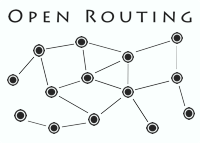Draining¶
Draining is a common term used in the computer networking world to describe
asking a network router to withdraw advertisement of prefixes it knows how to
get to and does not exist on itself (e.g. loopback prefixes).
This casues the network device to no longer injest traffic not destined to itself. Draining a device is used when we wish to do maintanence work or take it out of the “data path” if an operator suspects it’s causing issues (e.g. dropping packets).
Open/R has a few ways to be put in different classes of a “drained state”. Here we attempt to explain them.
Drain a running Open/R Device¶
Open/R has thrift endpoints to ask the daemon to drain itself. Open/R supports
draining a link and whole device/node. Using the breeze CLI is an option to
hit these endpoints and see/control the drain state.
See Drain Status¶
breeze openr interfacesalias of
breeze lm links
Drain¶
A link
breeze lm set-link-overload INTERFACE
A device/node
breeze lm set-node-overload
Undrain¶
A link
breeze lm unset-link-overload INTERFACE
A device/node
breeze lm unset-node-overload
API¶
If you wish to write you own tool, just look at the breeze commands source
code to workout the thrift calls used and the thrift files to inspect other API
options avaliable.
Drain startup flow¶
Here is the order of evaluation Open/R performs to work out if it should be in a “drained” state or not:
Look for a platform specific “I am undrained” file on the file system configured by
undrained_flag_path
e.g. for FBOSS we look at
/dev/shm/fboss/UNDRAINED
If set, look for a
persistent_config_store_pathfile and load the state from that file
This file is written out on clean Open/R shutdowns
We fallback to asumming drained if the config / CLI option
assumed_drainedis set or not
Configuration File Options¶
The config file has options to tune draining behavior. The CLI options default from the configuration file. The configuration file is the preferred way to configure Open/R.
assume_drained: Bool of wether or not topersistent_config_store_path: File path of where to stire persistent configuration data - e.g. Overload stateundrained_flag_path: File path of a file to look for to unset node overload bit at startup
CLI Arguments¶
Open/R has the following CLI/configuration options to control drain behavior:
-override_drain_state: override persistent store drain state with value passed inassume_drainedconfiguration setting
